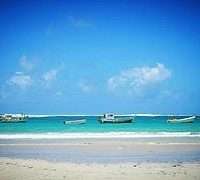The Liberian Civil War was doubtless one of the most devastating conflicts in recent history. Spanning from 1989 to 2003, an estimated 250,000 Liberians were killed during the war, and countless more were victims of atrocities. Liberia was founded in 1820 by freed enslaved people from the United States and Carribean, and had long struggled… Read More "Women Working Together to Rebuild Liberia after the Civil War"
“I Get It:” Experiential Learning in Ecuadorian Narcotics Control
In the late eighties, drug trafficking into the United States from Latin America came into the spotlight with Reagan’s War on Drugs, a global campaign led by the United States aiming to reduce the illegal drug trade. 1986 saw President Ronald Reagan declare drug trafficking a national security threat, immediately amplifying national attention and resources… Read More "“I Get It:” Experiential Learning in Ecuadorian Narcotics Control"
Of Labor Parties and Movements Across the Atlantic
World War II brought great uncertainty in its aftermath. The rise of Anti-Right and Anti-Left wing movements, for example, contributed to the hegemonic battle between the United States and the Union of Soviet Socialists Republics. These events, in turn, had an effect on labor. Following the Second World War, the United States launched the European… Read More "Of Labor Parties and Movements Across the Atlantic"
Environmental Diplomacy: The United States and Russia in the Arctic
A desolate landscape and frozen ocean seems like an unlikely place for the scene of major world events and geopolitical confrontation. But as climate change accelerates the thawing of the Arctic polar caps, it welcomes an abundance of natural resources, fisheries, and commercial sea routes. The countries bordering the Arctic Ocean, including the United States… Read More "Environmental Diplomacy: The United States and Russia in the Arctic"
American People’s Foreign Policy: USAID’s Role in Apartheid South Africa
In 1986 Congress overrode a presidential veto on major foreign policy. During the 1980s, the American public increasingly resented the South African system of apartheid and urged the United States government to take major action. This led to bipartisan Congressional action to override President Reagan’s veto of the Comprehensive Anti-Apartheid Act [CAAA] of 1986. This… Read More "American People’s Foreign Policy: USAID’s Role in Apartheid South Africa"
Grains, Cows, and the End of the Cold War
The end of the Cold War is sometimes thought about as a dramatic and rapid event marked by the fall of the Berlin Wall and the collapse of the USSR. While these were notable moments at the end of the Cold War, the reality was much more complicated. Charles O’Mara’s stunning account of his time… Read More "Grains, Cows, and the End of the Cold War"
Robert Reis, a longtime State Department official, is a perfect example of how far one can come from the American Heartland. Born and raised in St. Louis, Missouri, he eventually served in all corners of the globe, including Somalia. Throughout his broad career, he worked in a range of positions dealing with all matters including… Read More "The Variety of a Foreign Service Career: Bananas, Beaches, and a Plane"
Resolving the Southeast Asian Nuclear Weapon Free Zone Issue—Treaty of Bangkok
During the 1990s, there were many international agreements created to limit nuclear weapons and the potential consequential effects of deploying these weapons. This began with the signing of the second Strategic Arms Reduction Treaty (START-2) in 1993, continued with the indefinite extension of the Non-Proliferation Treaty (NPT) in 1995, and the creation of the Comprehensive… Read More "Resolving the Southeast Asian Nuclear Weapon Free Zone Issue—Treaty of Bangkok"
Investing in China as its Economy Starts to Take Off in the 1990s
China’s economic transformation launched its economy to new heights during the 1990s, allowing it to have a stronger international presence. A country with a rapidly developing economy and an enormous population made China an extremely appealing market for American companies to invest in. However, there were still issues that needed to be addressed. This resulted… Read More "Investing in China as its Economy Starts to Take Off in the 1990s"
A Foreign Service Spouse on a Mission: Combating Human Trafficking in Greece
Whether being assigned to a new post, taking on a new position, or learning a new language, the careers of Foreign Service Officers (FSOs) are continually evolving. However, they are often not alone on their diplomatic journeys. Many Foreign Service Officers carry out their duties overseas alongside their spouses. While there are certain responsibilities that… Read More "A Foreign Service Spouse on a Mission: Combating Human Trafficking in Greece"

